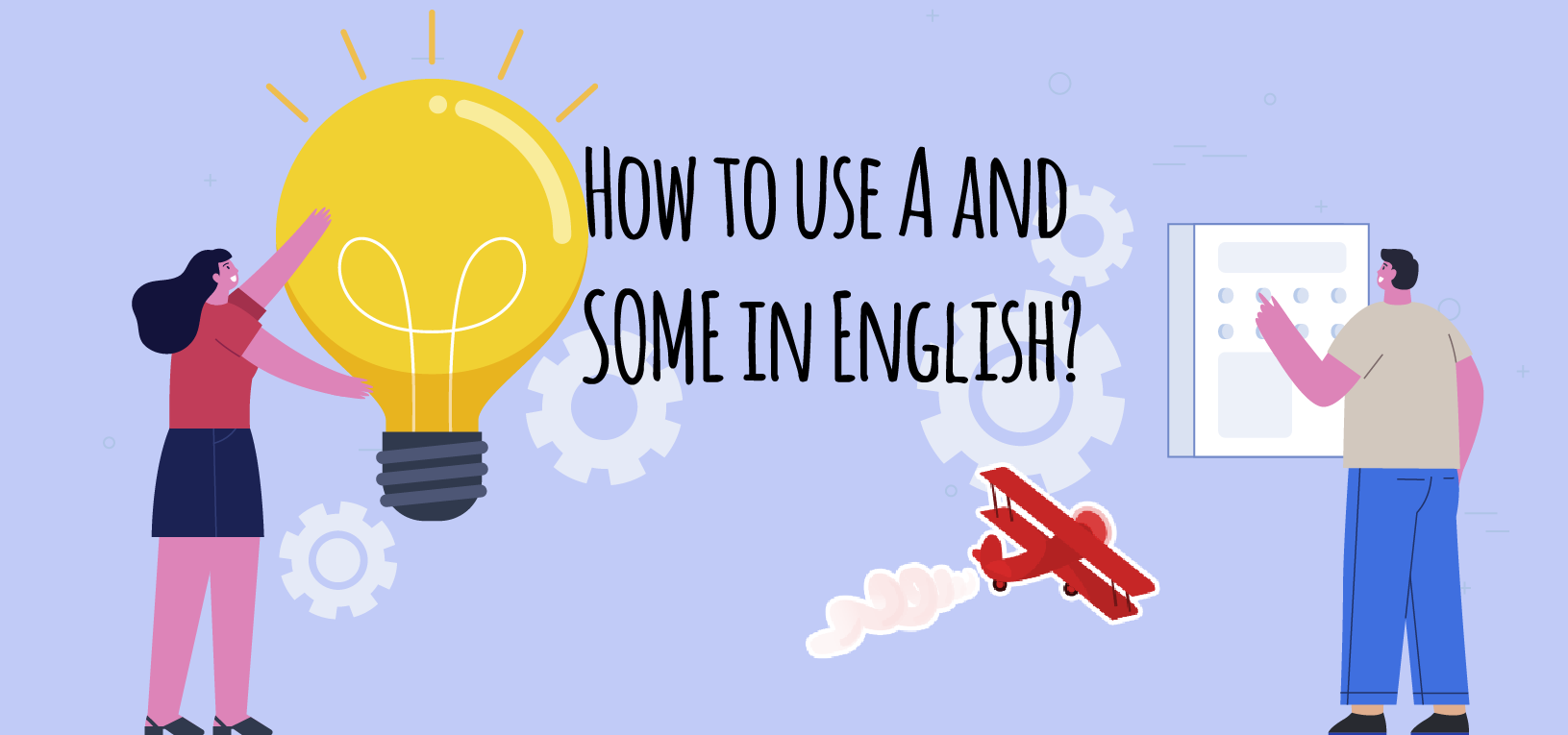How to use A and SOME in English?

A / an, any and some
INDEX OF CONTENTS
- We use A / AN (un) with singular countable nouns
- Some and any
- Questions with some and any
- Summary table
The literal meaning of the determinants is usually the same . Some and any could be translated by some / a, some / as and generally we use it when we do not need to determine exactly the amount of what we are referring to.
It used some in affirmative sentences and when you want to ask or offer something. … On the other hand, any is used in questions (some, some of) or in negative sentences (none, nothing of). Note that any is used for uncountable and countable plural nouns.
We use A / AN (un) with singular countable nouns.
- My brother has a dog and my sister has a cat.
Mi hermano tiene un perro y mi hermana un gato
- There is an accident on the corner.
Hay un accidente en la esquina.
A is used when the next word begins with a consonant sound.
- A book
Un libro
- A guitar
Una guitarra
- A friend
Un amigo
- A university (The start of the word university sounds like YOU, a consonant sound).
Una universidad (El comienzo de la palabra universidad suena como USTED, un sonido consonante).
AN is used when the next word begins with a vowel sound.
- An Apple
Una manzana
- An ice-cream
Un helado
- An orange
Una naranja
- An hour (the letter H in this word is silent so it sounds like it starts with a vowel).
Una hora (la letra H en esta palabra es silenciosa, por lo que parece que comienza con una vocal).
Some and Any (alguno/a + algunos/as)
We use SOME and ANY with plural and uncountable nouns:
- SOME are generally used in positive sentences.
- Any is generally used in negative sentences
- I have some information for you about flights to Paris.
- (Positive – Uncountable)
Tengo información para ti sobre vuelos a París.
(Positivo – incontable)
- I don’t have any information for you about flights to Paris.
- (Negative – Uncountable)
No tengo ninguna información para usted sobre vuelos a París.
(Negativo – incontable)
- We met some friends for drinks after work yesterday.
- (Positive – Plural Countable)
Ayer nos reunimos con unos amigos para tomar algo después del trabajo.
(Positivo – Contable plural)
- I didn’t see any friends there on Thursday.
- (Negative – Plural Countable)
No vi a ningún amigo allí el jueves.
(Negativo – Plural Contable)
- I think he will have some time to speak to you today.
- (Positive – Uncountable)
Creo que hoy tendrá tiempo para hablar contigo.
(Positivo – incontable)
- I don’t think he will have any time to speak to you today.
- (Negative – Uncountable)
No creo que tenga tiempo para hablar contigo hoy.
(Negativo – incontable)
You can also use SOME and ANY in a sentence without a noun if the meaning of the sentence is clear.
- I didn’t eat any salad but Peter ate some. (salad)
No comí ensalada, pero Peter sí. (ensalada)
- Sean took lots of photos of the mountains but Emma didn’t take any. (photos)
Sean tomó muchas fotos de las montañas, pero Emma no tomó ninguna. (fotos)
Questions with SOME and ANY
Generally, we use ANY in questions.
- Do you know any famous people?
¿Conoces a personas famosas?
- Do you have any children?
¿Tienes hijos?
But, SOME is used in the following circumstances:
When we are offering something.
- Would you like some coffee?
¿Quieres un café?
- Do you want some sugar for your coffee?
¿Quieres azúcar para tu café?
When we are asking for something.
- Could I have some salt, please?
¿Podría darme un poco de sal, por favor?
- Can I have some fries with that?
¿Puedo comer unas patatas fritas con eso?
When we are suggesting something.
- Why don’t we watch some movies on TV tonight?
¿Por qué no vemos algunas películas en la televisión esta noche?
- Why don’t you give her some advice?
¿Por qué no le das un consejo?
You can also use SOME and ANY in a sentence without a noun if the meaning of the sentence is clear.
- I didn’t eat any salad but Peter ate some. (salad)
No comí ensalada, pero Peter sí. (ensalada)
- Sean took lots of photos of the mountains but Emma didn’t take any. (photos)
Sean tomó muchas fotos de las montañas, pero Emma no tomó ninguna. (fotos)
Summary table
| A – An-Some-Any |
| A/AN + singular countable nouns | ||
| A + CONSONANT SOUND | There is a bottle on the table. | |
| AN + VOWEL SOUND | There is an Apple on the table. | |
| SOME / ANY + plural countable nouns & uncountable nouns | ||
| + affirmative SOME There is some cheese in the fridge. | ||
| – negative ANY There isnt’t any cheese in the fridge. | ||
| ? questions ANY Is there any cheese in the fridge? | ||
| + | A A/AN | SOME | SOME |
| – | A A/AN | ANY | ANY |
| ? | A A/AN | ANY | ANY |
| ? QUESTIONS 1 Offer | Would you like some..? | SOME | SOME |
| ? QUESTIONS 2 Ask off | Can I… some…? | SOME | SOME |
| ? QUESTIONS 3 Suggest | Why don’t… we…some? | SOME | SOME |


